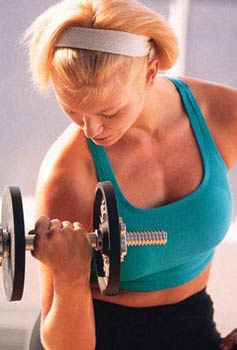 The headline of a story at ABC news about infertility among female athletes is “Female Athletes Are Too Fit To Get Pregnant“. Many women athletes in their 20s, at peak performance levels and peak physical fitness by most measures, may find themselves unable to conceive. This is attributed to low percentages of body fat, which essentially shut down the hypothalamus, which then fails to trigger the H-P-O (hypothalamus, pituitary, ovary) hormone sequence necessary for regular menstrual cycles. About 12% of infertile women seeking treatment are athletes.
The headline of a story at ABC news about infertility among female athletes is “Female Athletes Are Too Fit To Get Pregnant“. Many women athletes in their 20s, at peak performance levels and peak physical fitness by most measures, may find themselves unable to conceive. This is attributed to low percentages of body fat, which essentially shut down the hypothalamus, which then fails to trigger the H-P-O (hypothalamus, pituitary, ovary) hormone sequence necessary for regular menstrual cycles. About 12% of infertile women seeking treatment are athletes.
According to the article, even women who are not professional athletes (or training at that level) can experience infertility due to physical fitness:
It noted that recreational jogging — only 12 to 18 miles a week — can result in poor follicular development, decreased estrogen and progesterone secretion and absent ovulation.
Setting aside the seriousness of infertility, I’m intrigued by the tone of the article, and especially the language of the headline. In North America today, there is a strong emphasis socially and in mass media on the importance of exercise and being physically fit, and corresponding demonization of fatness as a personal moral failing. But amenorrhea and infertility as a result of thinness is reported without judgment and body-shaming. There are no quotations from experts about women exercising too much or advice to stop working out; instead, professional athletes are advised to freeze their eggs in their early 20s. When fat* women have trouble conceiving or have difficult pregnancies, it is frequently attributed to their weight, which is presumed to be a behavioral a matter of choice.
*I am following the practice of other advocates of fat acceptance and Health At Every Size (HAES) in using the term fat as a descriptive adjective, not a pejorative.


Dr. Jerilynn Prior, endocrinologist and scientific director at the Centre for Menstrual Cycle and Ovulation Research, and SMCR member, was quoted in a magazine article a few years ago about heavy physcial activity and menstrual cycle difficulties. She noted that for many women, eating just a few hundred more calories a day can overcome the ‘energy deficit’ that is impairing cycle function. Women athletes who do lose their periods and their fertility should be concerned. Anovulation has many negative health implications beyond infertility, like loss of bone density. All coaches of female athletes should become more knowledgable about this subject.
As if women need more pressure around ability to conceive or around motherhood.
You’re right, Heather. What women need is more information about how to maintain healthy menstrual cycles, preferable ovulatory, and the many reasons for why it is important including, most ironically for female athletes, to build muscle, strength and endurance.